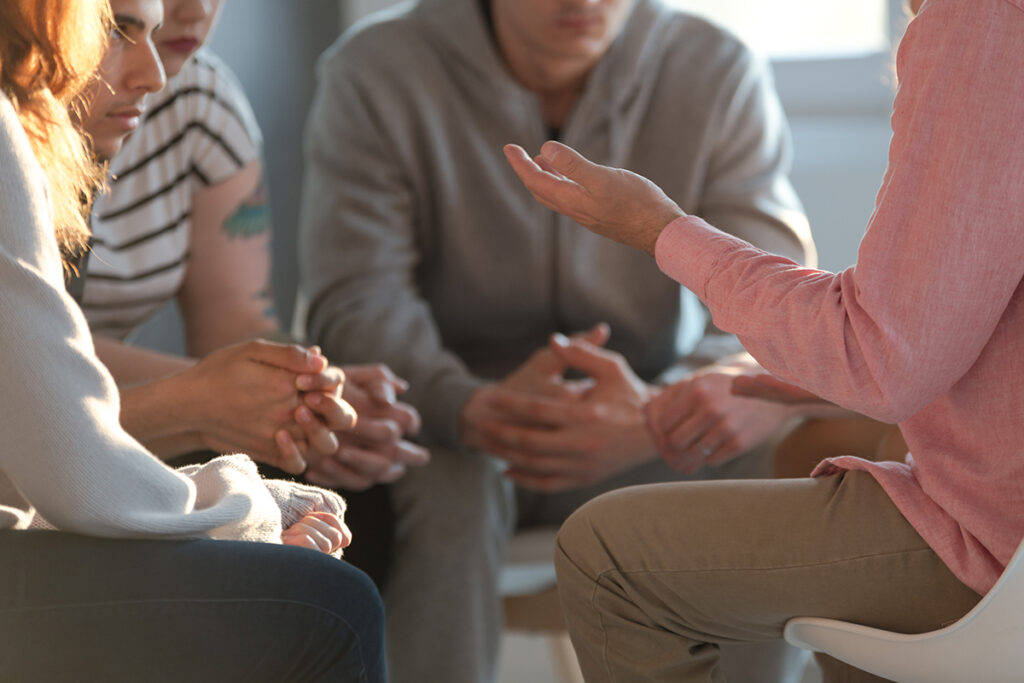Group activities for addiction counseling is a valuable part of addiction recovery. Working with a group of others who share similar challenges provides meaningful insights and allows participants to practice the new interpersonal skills they are learning in recovery. Group therapy activities add a new layer of interest and potential to traditional therapy. If you could benefit from a group therapy program, contact Northpoint Omaha today at 888.687.8014 for more information.
What Is Group Therapy?
Addiction treatment typically involves several types of therapy aimed at addressing various aspects of an individual’s recovery journey. These therapies include one-on-one therapy, where a patient works closely with a therapist to explore their personal struggles and develop coping strategies. Family therapy is another crucial component. It involves the patient’s loved ones in the healing process, fostering understanding and support.
Experiential therapy, on the other hand, takes a hands-on approach, utilizing activities such as art therapy, music therapy, or outdoor activities to promote self-expression and emotional growth. And of course, group therapy brings individuals together with one or more therapists to create a safe space for sharing experiences, and providing and receiving peer support.
During group therapy sessions, the format is typically determined by the overseeing therapist but remains flexible to cater to the unique needs of the group. It may involve educational sessions to enhance understanding of addiction, skills development to facilitate healthier coping mechanisms, or simply focus on the power of support and connection. Incorporating structured activities within group therapy enables participants to gain more hands-on experience and further reinforce their recovery journey.
Group Therapy Activities
In addiction counseling, group activities are thoughtfully selected based on the specific needs of the group. These activities serve multiple purposes. One, they keep the members engaged. Two, they also facilitate the breaking down of barriers, fostering a sense of comfort and trust among participants.
It is crucial to recognize that the process of addiction recovery is already emotionally charged and delicate. Therefore, expecting virtual strangers to openly share their deepest thoughts and vulnerabilities during their initial encounter might prove to be overwhelming for some individuals. Instead of promoting openness, this approach could potentially cause some people to withdraw and close themselves off. Hence, creating a safe and supportive environment where individuals gradually build trust and feel comfortable to open up is paramount in addiction counseling.
Here are some activities that are frequently used in group therapy:
Icebreaker Activities
Icebreakers are meant to ease the discomfort of meeting strangers and provide group members with a way to share something about themselves.
Two truths and a lie is an activity where participants share two statements about themselves that are true and one that is false. Other members try to guess which is which.
Discussing common triggers is another helpful icebreaker. Everyone in addiction recovery must learn to cope with the triggers that tempt them to use drugs or alcohol. A discussion of triggers helps participants see how much they have in common and can offer new insight into dealing with triggers.
Nonverbal Activities
Therapy involves a lot of talking about feelings, but sometimes patients need a break from talking. Non-verbal activities provide the chance to contemplate their innermost thoughts quietly.
The burning bowl ceremony is useful for many different purposes. Participants write a list of emotional burdens they no longer want to carry on a piece of paper and place the paper in a large bowl. The bowl is carried outdoors to a fire-safe area, and the papers are burned. Patients can choose to share what they let go of or not.
Ask patients to draw a basic “tank” representing their personal gas tank. Just like a car, people can’t run on an empty tank. Have them fill the empty tank with drawings or words that represent the thoughts, people, and events that keep their tank full.
Self-Care Activities
Good self-care is foundational to long-term sobriety. Recovery patients need to learn the importance of self-care and how a lack of it can make them more vulnerable to relapsing.
Discuss the basics of self-care. What does it mean to the individual, and what makes them feel cared for? Self-care activities to practice include:
- Forgiving oneself and others for past mistakes
- Healthy lifestyle practices, such as eating regularly and getting adequate amounts of sleep, and exercise
- Practicing meditation or other mindfulness exercises
- Building a sober support network
- Participating in sober social activities
- Helping others and being of service to their community
- Allowing time for personal interests, such as reading, sports, creative endeavors, and other hobbies
Self-care can mean different things to different people. Encourage patients to make their list as personal as possible.
Northpoint Omaha Offers Group Activities for Addiction Counseling
At Northpoint Omaha, we understand that each person’s recovery journey is unique. We strive to include a variety of therapeutic techniques to keep every patient engaged and enthusiastic about their treatment. Contact Northpoint Omaha today at 888.687.8014 to learn more about our addiction recovery programs.

